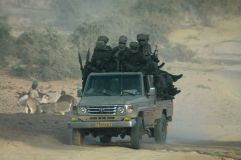Armed groups maraud along Chad-Sudan border – HRW
June 22, 2006 (NEW YORK) — The governments of Chad and Sudan support armed groups that are committing serious crimes against civilians in eastern Chad, Human Rights Watch said in a briefing paper released today.
 The 28-page briefing paper, “Violence Beyond Borders: The Human Rights Crisis in Eastern Chad” documents a drastic deterioration in the human rights situation on the Chad side of the Chad-Sudan border, where Sudanese government-backed “Janjaweed” militias raid at will, and Darfur rebels opposed to Khartoum forcibly recruit Sudanese refugees, including children, to serve as rebel fighters. Hundreds of Chadian civilians have been killed in recent weeks in attacks by Sudanese militias and allied Chadian fighters, and more than 50,000 have been displaced.
The 28-page briefing paper, “Violence Beyond Borders: The Human Rights Crisis in Eastern Chad” documents a drastic deterioration in the human rights situation on the Chad side of the Chad-Sudan border, where Sudanese government-backed “Janjaweed” militias raid at will, and Darfur rebels opposed to Khartoum forcibly recruit Sudanese refugees, including children, to serve as rebel fighters. Hundreds of Chadian civilians have been killed in recent weeks in attacks by Sudanese militias and allied Chadian fighters, and more than 50,000 have been displaced.
“Civilians in eastern Chad are trapped between the carnage in Darfur and Chad’s downward spiral into chaos,” said Peter Takirambudde, director of the Africa division at Human Rights Watch. “Khartoum and N’djamena must immediately end their support for the armed groups wreaking havoc for civilians on both sides of the border.”
The Chadian government’s support for operations by Darfur rebels, including the recruitment of refugees in camps, appears to be linked to the government’s attempts to defeat rebel efforts to oust President Idriss Déby. The Chadian rebels, apparently with Sudanese government support, have used Darfur as a launching pad for attacks on Chadian towns since late 2005. In the most serious attack on April 13, Chadian rebel forces besieged N’djamena, Chad’s capital, but were repelled by the Chadian military, who were helped by Darfur rebels.
The Sudanese government recruited and armed the “Janjaweed” militias several years ago as part of its counter-insurgency strategy in Darfur. Khartoum has yet to disarm these militias and prosecute them for war crimes and crimes against humanity committed in Darfur, despite a commitment to do so under United Nations Security Council resolutions.
Sudanese militias are ranging deeper into Chad than ever before, looting and attacking villages on an apparent ethnic basis. A June 3 raid struck 75 kilometers inside the border, close to a refugee camp hosting 20,000 Sudanese in the Goz Beida region. In a particularly brutal incident earlier reported by Human Rights Watch, 118 civilians were killed on April 12-13 in Djawara, eastern Chad, simultaneous with the unsuccessful coup attempt in N’Djamena by Chadian rebels.
In a new and worrying development, Sudanese militias have formed alliances with Chadian ethnic groups, prompting fighters from Arab, Mimi, Ouaddai and Tama tribes from Chad to join Sudanese armed groups in raids that have been linked to the attempts by Chadian rebels to oust Déby.
“The Janjaweed attacks are not only killing and displacing Chadian villagers; they’re worsening latent ethnic tensions in Chad,” said Takirambudde. “If the raids aren’t stopped, there’s a real danger that communal violence could explode in eastern Chad.”
In March, a faction of the Sudanese Liberation Army (SLA), a Darfur-based rebel group, forcibly recruited several thousand Sudanese refugees from camps in eastern Chad to serve as rebel fighters. Some recruits who tried to escape from the rebels were tortured. More than 200,000 Sudanese refugees live along the Chad-Sudan border in 12 refugee camps that are supervised by the United Nations.
This Darfur rebel faction, led by Commander Khamis Abdallah Abaker, operates freely on the Chad side of the border with the apparent acquiescence of the Chadian government. Khamis Abdallah’s rebel group recruited several thousand refugees from the camps, including hundreds of boys, and held many of them under brutal conditions. At least one person was tortured and beaten so badly that he later died.
“The Chadian government is supposed to protect Sudanese refugees, not let rebels abuse them,” said Takirambudde. “The authorities must keep civilians safe from further attack, whether they’re living in the refugee camps or the countryside.”
Human Rights Watch said that the developments in Chad’s border zone demonstrate yet again the urgent need for a stronger, mobile international civilian protection force to be deployed both within Darfur and along the border with Chad.
To read the briefing paper, “Violence Beyond Borders: The Human Rights Crisis in Eastern Chad,” please visit:
http://www.hrw.org/backgrounder/africa/chad0606
To view the photographs by Luc Delahaye of the Human Rights Watch mission to Djawara, Chad, please visit:
